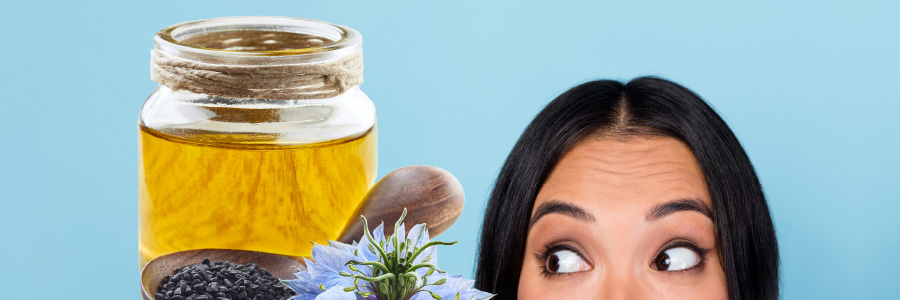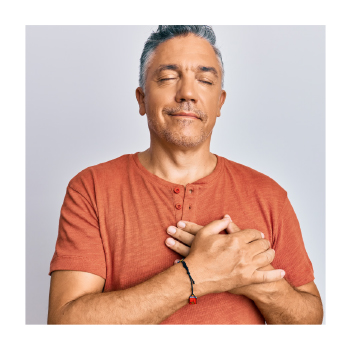


Sign-up for {N}power to get exclusive discounts, newsletters, members-only features, and more!

Are you ready to take your health to new heights? Look no further than the little seed that could, or rather, its oil: black seed oil. With serious head-to-toe health benefits, black seed oil is an immune-system modulator, an allergy-relieving rockstar, a free-radical scavenging superhero, a cardiovascular-supporting star, and a blood-sugar balancing boss. It also supports healthy weight, combats stress, provides mood support, and even has positive effects on joint health, digestive health, and men’s reproductive health. Black seed oil is truly brimming with benefits.


Also known as black caraway, black cumin, and nigella seed, black seed oil (actually light yellow once extracted) contains more than 100 biologically active compounds, including thymoquinone, a compound with potent antioxidant properties.1 2 3 It acts as an immune modulator, or in other words, it keeps the immune system balanced so it doesn’t over or under-react to an infection. Black seed oil quenches dangerous inflammation and boosts appropriate immune function, resulting in enhanced protection against infections; it also eases coughs, bronchitis symptoms, and cold symptoms.4 5 6
Research shows that through its antioxidant, immune-balancing, and anti-inflammatory benefits, black seed oil is a powerful immune ally, especially when it comes to respiratory health.7 A 2022 randomized, double-blind, placebo-controlled study evaluated the effects of black seed oil supplementation on upper-respiratory tract infections.
The study included 37 recreational runners who took either 500 mg of black seed oil daily (standardized to 3% thymoquinone) or a placebo for four weeks. The results showed that upper-respiratory tract complaints, including symptoms such as cough, sore throat, sniffles, stuffiness, etc., were 62 percent lower in the black seed oil group compared to the placebo group.8
A 2024 study, including 230 pediatric patients (6-18 years old) with upper respiratory tract infections, found that taking black seed oil for one month significantly alleviated the severity of symptoms, decreased the frequency of infections, and reduced antibiotic use among the children. Doses depended on age and weight and ranged from 1.25 mL twice daily to 5 mL twice daily.9
Approximately 18 million Americans suffer from allergies; the symptoms can range from simple annoyance to completely debilitating. Instead of reaching for another over-the-counter (OTC) treatment, fight your allergy symptoms naturally (and effectively) with black seed oil. Studies show that thymoquinone significantly reduces inflammatory molecules that play a role in allergy-related symptoms.10 11 A study of patients with allergic rhinitis showed that treatment with black seed oil resulted in a drastic decrease in IgE antibodies (antibodies that indicate an allergic response) in nasal secretions, as well as significant reductions in nasal congestion and itching, runny nose, and sneezing attacks.12
In a 2024 study, 65 subjects who had two or more allergy symptoms, such as sneezing, runny nose, nasal obstruction, or nasal itching, for more than one hour per day were randomized to take either 250 mg black seed oil (standardized to 5% thymoquinone) or a placebo twice per day for 15 days. In as little as 24 hours, the allergic rhinitis symptoms decreased by 39.2 percent in the black seed oil group compared to only 24.6 percent in the placebo group. At the end of 15 days, those in the black seed oil group saw a 41.5 percent reduction in nasal symptoms compared to only 13.4 percent in the placebo group.13

Research has found that black seed oil benefits cardiovascular health in a number of ways. With its strong antioxidant properties, black seed oil neutralizes lipid (fat) oxidation and reduces the oxidation of LDL cholesterol, a major trigger for the atherosclerotic plaques that block blood flow and cause heart attacks and strokes.14 Studies have shown that black seed oil can improve the lipid profile and prevent cardiovascular disease in both healthy people and those with high levels of fat particles, such as cholesterol and triglycerides, in the blood (known as hyperlipidemia).15
Black seed oil also reduces high blood pressure. Results from a double-blind, eight-week study looking at the effects of black seed oil on hypertension showed that, at 2.5 mL twice a day, the oil-treated group had significantly decreased systolic and diastolic numbers compared with the baseline and placebo group at the end of the trial, without any adverse effects.16
A known risk factor for cardiovascular disease is also being overweight and having poor metabolic health, and it is estimated that 40 percent of the world’s population is overweight or obese, which is predicted to steadily rise.17 Black seed oil can help reverse this worrisome trend.
A 2021 study investigated the effect of taking 2,000 mg of black seed oil per day for eight weeks in overweight and obese women. At the end of the study, the black seed oil group exhibited significant reductions in body weight, body mass index (BMI), waist circumference, body fat percentage, body fat mass, and visceral fat mass. Subjects in the black seed oil group also reported feeling more satiated and experiencing less hunger at the end of the study.18
A more recent study, from 2024, found that supplementation with black seed oil for eight weeks significantly reduced gene expression and serum levels of inflammatory cytokines and leptin levels (a hormone produced by fat cells that play a direct role in appetite regulation and energy expenditure) in overweight and obese women. It also led to small, but significant decreases in fasting insulin levels.19 20 Finally, a review of 13 clinical trials on black seed oil’s effect on blood sugar found that black seed oil decreased fasting blood sugar, insulin levels, and insulin resistance.21 22

Looking for ways to stay loose and limber? Want to make pain-free movement your reality? Several studies show that black seed oil can help reduce inflammation and pain in osteoarthritis (OA). In a 2022 double-blind, placebo-controlled trial, intake of 2.5 mL of black seed oil three times a day for one month in subjects aged 50-70 years old with knee OA, showed a significant reduction in WOMAC total scores (a self-reported questionnaire that measures pain, stiffness, and physical function in people with hip or knee OA). It also reduced scores for pain and the need for pain medication compared to placebo.23
Another study found that taking 2.5 mL of black seed oil twice daily for six weeks significantly reduced C-reactive protein (CRP) levels as a marker of inflammation. Additionally, this study also found that oral and topical black seed oil (2.5 mL rubbed on the knee three times daily) significantly improved physical function and pain compared to placebo. The researchers concluded, “Both oral and topical N. sativa oil increased the quality of life.”24
Does it feel like you’ve tried just about everything under the sun to improve your sleep? Black seed oil may be the missing link. A 2022 study found that after taking 200 mg of black seed oil daily after dinner for 28 days, the total deep sleep time increased by approximately 83 percent, while rapid eye movement (REM) sleep increased by around 31 percent.25 The subjects also reported significantly better sleep quality, including improvements in sleep latency (the time it takes to fall asleep), sleep duration, and reductions in sleep disturbances. There were also significant improvements in perceived anxiety and stress and a significant reduction in serum cortisol levels at the 28-day mark.26
Mood tanked? Black seed oil shows promise. A study examining the effect of black seed oil on mood in adolescents ages 14-17 showed that 500 mg once a day for four weeks stabilized mood, decreased anxiety, and positively modulated cognition compared to a placebo.27 Great news for the parents of angsty teens! Another study including male adults with major depressive disorder found that 1,000 mg of black seed oil daily for 10 weeks (in addition to their normal SSRI medication) significantly decreased depression scores compared to placebo (the group who only received the SSRI). The intervention group also had significantly higher serum levels of BDNF (brain-derived neurotrophic factor; a critical protein in the brain that promotes neuronal growth and development and supports healthy brain function).28
When it comes to supporting a healthy gut microbiome and the integrity of the gut lining, look no further than black seed oil. In a study looking at the effects of a combination of black seed oil and honey in patients diagnosed with functional dyspepsia (chronic indigestion, which affects more than 20 percent of the population29), with symptoms including stomach pain, bloating, acid reflux, heartburn, and excessive burping, participants showed marked improvement after taking 5 mL of black seed oil plus equal parts honey and water daily for eight weeks compared to a placebo. It also reduced the rate of H. pylori infection (a common cause of stomach ulcers) compared to placebo. The researchers summarized, “This study showed that adjuvant supplementation of honey-based formulation of N. sativa can cause significant symptomatic improvement of patients with functional dyspepsia…”30
Black seed oil can support men’s fertility by promoting normal sperm structure and motility, in addition to healthy hormone levels. A 2014 study gave 68 infertile men with abnormal sperm structure and low sperm count and motility 2.5 mL of black seed oil or a placebo two times daily for two months. At the end of the study, sperm count, motility, structure, and semen volume were significantly improved in the black seed oil group compared to placebo. The study concluded, “Daily intake of 5 mL N. sativa oil for two months improves abnormal semen quality in infertile men without any adverse effects.”31
Topical Black Seed Oil for Total Body Health



Sign-up for {N}power to get exclusive discounts, newsletters, members-only features, and more!